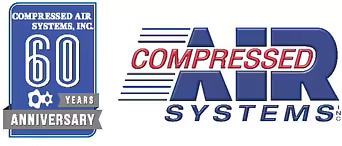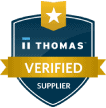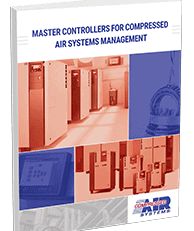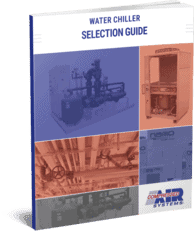Rotary Screw
Air compressors play a critical role in industry, providing clean, safe, and reliable energy for pneumatic equipment by employing various methods of positive or negative displacement to mechanically pressurize air. Reciprocating compressors use pistons to decrease gas volume and rank among the most common types of compressors.
While these systems are highly cost-effective and efficient enough for intermittent use, they typically do not provide the immediate, continuous access to compressed air needed in some heavy-duty industrial environments. In those settings, rotary screw air compressors offer a better choice, guaranteeing a reliable air supply exactly when and where it is needed.
Oil-Injected vs. Oil-Free Rotary Screw Compressors
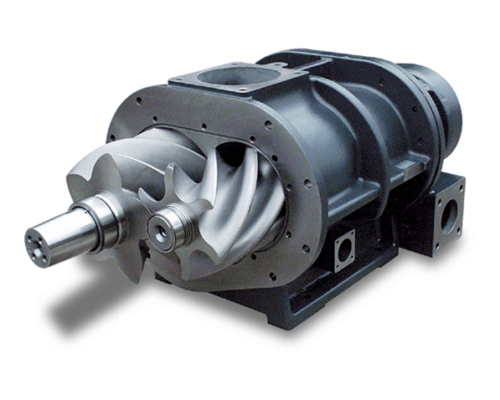 One of the primary considerations when selecting a rotary screw air compressor is whether your application calls for an oil-injected or an oil-free compressor. As their names suggest, the primary difference between these compressors lies in whether or not they use oil as a lubricant between the rotors.
One of the primary considerations when selecting a rotary screw air compressor is whether your application calls for an oil-injected or an oil-free compressor. As their names suggest, the primary difference between these compressors lies in whether or not they use oil as a lubricant between the rotors.
In oil-injected or oil-flooded compressors, a motor drives the male rotor, which seals to the female rotor via a thin film of oil. The male rotor then drives the female rotor, and their coupled movement forces air through the system. By contrast, oil-free systems use gears to drive the precise motion of the rotors. Since oil-free compressors lack the lubrication and hydraulic seal provided by oil, they tend to generate less pressure and more heat compared to oil-injected systems.
Oil-free compressors require two stages of compression to achieve the same pressure of a single-stage oil-injected compressor, making them less common for heavy-duty industrial applications. Instead, oil-free systems are primarily used in settings that require extremely clean air, since they do not mix additional oil into the gas during compression. While oil-injected systems filter the oil out, they still output more contaminants than oil-free compressors, which can be problematic in settings like food
handling.
Benefits of Rotary Screw Air Compressors
Oil-injected and oil-free rotary screw air compressors both help companies increase efficiency in high-volume compression applications. Unlike reciprocating compressors, rotary screw air compressors offer continuous airflow, eliminating the need to pause operations while a receiver tank fills. In addition to this 100% duty cycle, reciprocating compressors also offer the following key advantages:
- Higher CFM per HP than reciprocating compressors
- Ability to handle greater quantities of air than piston-based systems
- Long working life
- Easy and infrequent maintenance
- Excellent energy efficiency
- Clean air output, especially when using oil-free systems
- Quieter than reciprocating compressors
- Safe operation
Although they tend to be more expensive than reciprocating compressors, the myriad of benefits offered by rotary screw air compressors ensure that they will deliver excellent ROI over their long working life. The team at Compressed Air Systems can help you evaluate your application requirements to determine which rotary screw system would deliver the most value for your investment.
Rotary Screw Air Compressor Industries and Applications
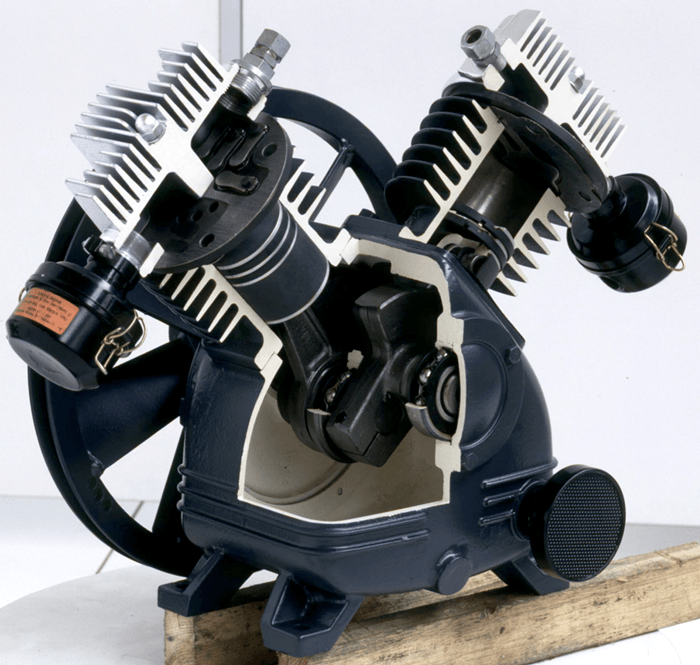 Rotary screw air compressors are an ideal pneumatic solution for any operation that requires safe and continuous access to compressed air. These devices power pneumatic tools across a wide range of industrial applications, including sectors such as:
Rotary screw air compressors are an ideal pneumatic solution for any operation that requires safe and continuous access to compressed air. These devices power pneumatic tools across a wide range of industrial applications, including sectors such as:
- Oil and gas
- Manufacturing
- Food packaging
- Construction
- Automotive
- Chemical
- Pharmaceutical
- Construction
- Agriculture
- Energy
- HVAC
In these and other sectors, rotary screw compressors power an expansive range of pneumatic equipment, such as jackhammers, conveyor belts, tractors, offshore drilling equipment, and much more. All of these devices benefit from the reliability and efficiency of rotary screw compressors, which also tend to be safer and more environmentally friendly than the alternatives. The team at Compressed Air Systems can help analyze your application to determine whether a rotary screw system is right for you.
FREQUENTLY ASKED QUESTIONS ABOUT Rotary Screw COMPRESSORS
What is a Rotary Screw Air Compressor?
A rotary screw air compressor is a highly efficient pneumatic device used to power a host of industrial tools. Compared to reciprocating air compressors, rotary compressors are significantly more efficient, delivering continuous airflow at a higher rate (measured in cubic feet per minute, or CFM). These advantages come from their unique mode of compression, which uses interlocking screw rotors to move air from a larger space into a smaller one.
How do Rotary Screw Air Compressors Work?
All air compressors work on the basic principle that the pressure of a gas inversely relates to the volume containing it. This fundamental fact means that air compressors can generate pressure and stored potential energy in one of two ways:
- They can increase the amount of gas contained in a vessel of a fixed volume.
- They can decrease the available volume to contain a fixed amount of gas.
Rotary screw air compressors use the latter technique—known as positive displacement—to mechanically squeeze trapped air into a smaller space. They do this by pushing air through two meshed rotors to reduce its volume and generate pressure.
Gas enters at an intake valve on one end of the rotary screw air compressor, and the rotation of the two meshed screws forces the trapped air to traverse the tank before exiting at the opposite end. The clearance between the male and female rotors is larger near the input and smaller at the discharge port, creating a reduction in volume and a corresponding increase in pressure.
The exact rotation mechanism will typically be a motor in oil-injected systems or a series of gears in oil-free systems. In oil-based systems, the air enters a filtration system after compression to remove and recycle any remaining lubricant.
High-Performance Rotary Screw Compressors by Compressed Air Systems
Many industrial users of reciprocating air compressors would achieve better performance from a rotary screw air compressor. Compressed Air Systems, Inc. has over 50 years of experience with pneumatic systems, and we’d be happy to help you evaluate your needs to determine whether a rotary screw air compressor would suit your operation.
In addition to consulting and sales, our capabilities include refits and in-house repairs of most pneumatic systems. We also supply a full catalog of reciprocating and rotary screw air compressors, ensuring that we can find an ideal pneumatic solution for virtually any application. To learn more about how Compressed Air Systems can help your facility, contact our team today.





